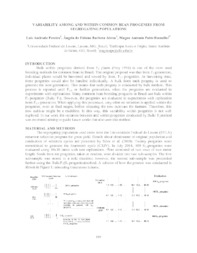Variability among and within common bean progenies from segregating populations.
Variability among and within common bean progenies from segregating populations.
Autoria: PEREIRA, L. A.; ABREU, A. de F. B.; RAMALHO, M. A. P.
Resumo: Bulk within progenies derived from F2 plants (Frey 1954) is one of the most used breeding methods for common bean in Brazil. The original proposal was that from F2 generation, individual plants would be harvested and sowed by lines, F2:3 progenies. At harvesting time, these progenies would also be handled individually. A bulk from each progeny is used to generate the next generation. This means that each progeny is conducted by bulk method. This process is repeated until F2:6 or further generations, when the progenies are evaluated in experiments with replications. Many common bean breeding programs in Brazil use bulk within F2 progenies (Bulk/ F2). However, the progenies are evaluated in experiments with replication from F2:3 generation. When applying this procedure, very often no selection is applied within the progenies, even at final stages, before releasing the new cultivars for farmers. Therefore, this new cultivar might be a multiline. In this way, this variability within progenies is not well explored. In our work the variation between and within progenies conducted by Bulk/ F2method was estimated aiming to guide future works that also uses this method.
Ano de publicação: 2017
Tipo de publicação: Artigo de periódico
Unidade: Embrapa Arroz e Feijão
Palavras-chave: Feijão, Melhoramento genético vegetal, Phaseolus vulgaris
Observações
1 - Por padrão são exibidas publicações dos últimos 20 anos. Para encontrar publicações mais antigas, configure o filtro ano de publicação, colocando o ano a partir do qual você deseja encontrar publicações. O filtro está na coluna da esquerda na busca acima.
2 - Para ler algumas publicações da Embrapa (apenas as que estão em formato ePub), é necessário ter, no celular ou computador, um desses softwares gratuitos. Sistemas Android: Google Play Livros; IOS: iBooks; Windows e Linux: software Calibre.
Acesse outras publicações
Acesse a Base de Dados da Pesquisa Agropecuária (BDPA) para consultar o acervo completo das bibliotecas da Embrapa.

